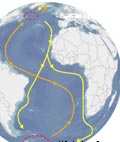Using a tiny device that records location, scientists have tracked the pole-to-pole migration of 11 Arctic terns, discovering that the small birds traveled an average of 44,000 miles a year, with one completing an annual round-trip journey of 50,700 miles. The new findings show that the Arctic tern migrates farther than any living thing and that, over the course of the tern’s three-decade lifespan, the bird — weighing just 3.5 ounces — travels 1.5 million miles. That’s equivalent to three round-trips to the moon. The latest study, conducted by an international team of scientists and published in the Proceedings of the U.S. National Academy of Sciences, used “geolocators” attached to the birds’ legs. The devices, weighing just .05 ounces, recorded the birds’ location by measuring light intensity and day length. The study, which nearly doubled the estimate of the terns’ migrations, showed that after leaving Greenland and Iceland in the fall, the birds fed in Arctic waters before flying south to the Antarctic Peninsula. They followed two routes, along the coast of South America or Africa. The birds then spent the southern summer in Antarctica before returning to the Arctic in April and May, following an S-shaped path to take advantage of wind currents. On the way home, the birds averaged 323 miles per day.
Migration of Arctic Terns Can Reach 50,000 Miles Per Year
More From E360
-
WILDLIFE
A Troubling Rise in the Grisly Trade of a Spectacular African Bird
-
MINING
In Myanmar, Illicit Rare Earth Mining Is Taking a Heavy Toll
-
INTERVIEW
How Batteries, Not Natural Gas, Can Power the Data Center Boom
-
ANALYSIS
As U.S. and E.U. Retreat on Climate, China Takes the Leadership Role
-
Solutions
From Ruins to Reuse: How Ukrainians Are Repurposing War Waste
-
ANALYSIS
Carbon Offsets Are Failing. Can a New Plan Save the Rainforests?
-
Energy
Facing a Hostile Administration, U.S. Offshore Wind Is in Retreat
-
Biodiversity
As Jaguars Recover, Will the Border Wall Block Their U.S. Return?
-
WATER
An E.U. Plan to Slash Micropollutants in Wastewater Is Under Attack
-
INTERVIEW
This Data Scientist Sees Progress in the Climate Change Fight
-
Climate
As Floods Worsen, Pakistan Is the Epicenter of Climate Change
-
Climate
Heat Stress Is a Major Driver of India’s Kidney Disease Epidemic
